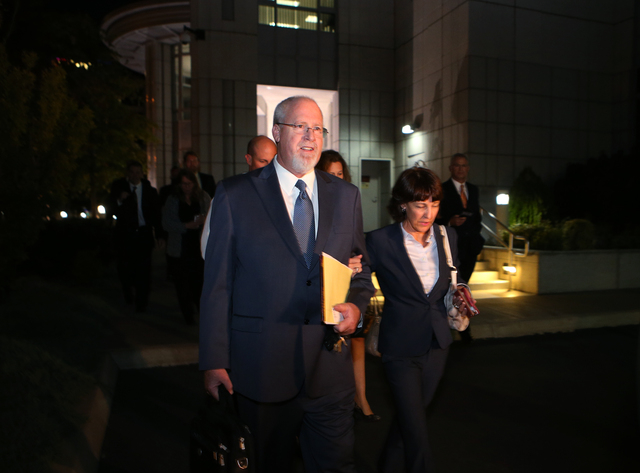Whittemore verdict sad, tragic – but also just

Ask yourself this: Why would a person want to donate a large amount of money to a politician, so that only the donor and the recipient knew where the money came from?
It could be that former lobbyist Harvey Whittemore didn’t have evil intent when he wrote checks to 29 family members and employees to cover $133,400 in donations to Senate Majority Leader Harry Reid’s campaign in 2007. It could simply be that he was up against a tight deadline and wanted to honor a promise he’d made to a longtime friend to raise a sizable sum.
But isn’t it just as likely that a person would conceal a single large donation through myriad reimbursed straw contributors in order to build influence with a politician in such a way that the public could not discover it by examining campaign contribution reports? Or to repay that hypothetical politician for past help in a way not easy to discern?
Of course it is. That’s why the law limits individual contributions to lawmakers and requires disclosure of the same: So the public might know who’s trying to buy influence with whom.
Whittemore was sentenced to two years in federal prison Monday for violating campaign finance laws in place in 2007. It was a sad end to a career in which he strode the hallways of the Legislative Building in Carson City like a political colossus, dubbed the “64th legislator” for the power he amassed as the lobbyist for the casino, liquor and tobacco industries. “When Harvey Whittemore speaks, the Nevada Senate listens,” one lawmaker defeated by Whittemore’s maneuverings once said.
But on Monday, it was Whittemore speaking, through tears, admitting wrongdoing and asking U.S. District Judge Larry Hicks for mercy in a Reno courtroom. In a statement before his sentencing, Whittemore admitted to arrogance, to naivete and to giving himself bad legal advice. Ironically enough, it’s Whittemore’s background as a lawyer and lobbyist that most recommended him for punishment — if he’d really been ignorant of the law, his plea for mercy would have made more sense. But because he’d operated in the political system for so long, it was manifest that he knew what he was doing was wrong, yet he did it anyway. He drew family members and employees into his felonious conspiracy as well. (Reid was not charged in the case, and he denied knowing about the scheme.)
Whittemore was also adept at manipulating the legislative system, and he earned a good deal of respect as a result. (After his June indictment, at least one lobbyist asked, “Did you see what they did to Harvey?”) But his lobbying practice occasionally tilted toward the outrageous: He backed a bill that would have retroactively erased the infamous Tailhook assault verdict. He tried to write a law that would have allowed him and some neighbors to build a prohibited private pier at his Lake Tahoe estate. He got away with so much, it’s possible to believe his 2007 transgression and resulting conviction were somehow inevitable. And ironic, too: Today, the law would allow Whittemore to donate $150,000 to a 501(c)(4) nonprofit organization, and the public would never hear a thing about it.
Whittemore was not and should not have been prosecuted for his successful lobbying career, however. He was convicted only of violating campaign finance laws, and he was punished only for those violations. His former opponents might take some measure of glee in his downfall, but it was difficult not to be at least somewhat moved by an obviously proud man finally brought low by his own misdeeds.
But in the end, Whittemore’s tears and tardy expressions of regret were not enough to save him from time behind bars, nor should they have been. Whittemore’s denouement was many things — tragic, sad, even pathetic — but it was also just.
Steve Sebelius is a Las Vegas Review-Journal political columnist and author of the blog SlashPolitics.com. Follow him on Twitter (@SteveSebelius) or reach him at (702) 387-5276 or ssebelius@reviewjournal.com.












